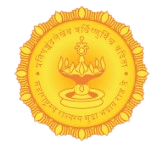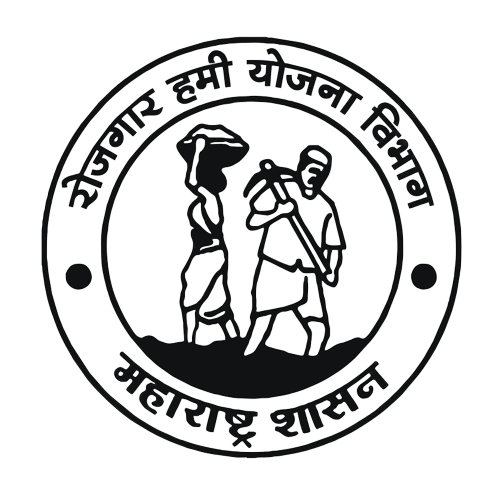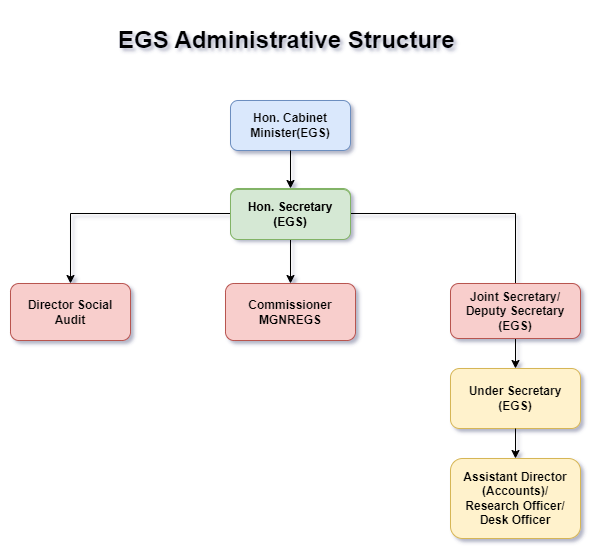- Maharashtra SEGC
- Organisation Structure
- Social Audit Unit (SAU)
- Ombudsperson
- Implementation Mechanism
- Subject List
Maharashtra State Employment Guarantee Council
Under the National Employment Guarantee Act, 2005, The Maharashtra State Employment Guarantee Council (MSEGC) under the chairmanship of the Honourable Chief Minister, Government of Maharashtra was established by Government Resolution issued by Planning Department Vide क्र. रोहप-2005 प्र. 171 /रोहयो-८, दि. 04.01.2006 . This Council was reconstituted by Government Resolution No MAGROHYO-2011/S. No 86/ROHYO-10 Dated 13.10.2011. The members of the council are as under
| 1 | Hon. Chief Minister | Chairman |
| 2 | Hon. Deputy Chief Minister | Vice Chairman |
| 3 | Hon. Minister, (Rohyo) | Executive Chairman |
| 4 | Hon. Minister, (Rural Development) | Member |
| 5 | Hon. Minister, (Water Conservation) | Member |
| 6 | Hon. Minister (Agriculture) | Member |
| 7 | Hon. Minister of State (Rohyo) | Member Secretory |
| 8 | Hon. Secretary (Rohyo) | Member |
| 9 | Hon. Principal Secretary (Rural Development) | Member |
| 10 | Hon. Principal Secretary (Planning) | Member |
| 11 | Hon. Principal Secretary (Agriculture) | Member |
| 12 | Hon. Commissioner (MGNREGS) | Member |
The responsibility of the Maharashtra State Employment Guarantee Council is as under
- Advising the State Government on all matters concerning the Scheme and its implementation; determining and preparing the list of the preferred works.
- Reviewing the monitoring and redressal mechanisms, from time to time, and recommending improvements; promoting the widest possible dissemination of information about the Act and the Schemes made under them.
- Monitoring the implementation of this Act and the Scheme.
- Preparing the annual report to be laid before the State Legislature.
- Any other duty or functions as may be assigned to it by the State Government.
The Maharashtra State Employment Guarantee Council shall have the power to undertake an evaluation of the National Rural Employment Guarantee Scheme and for that purpose to collect or cause to be collected statistics pertaining to the rural economy and the implementation of the Schemes.
Organisational Chart
———————————————————————————————————————————————————————————————————————————————————–
Social Audit Unit (SAU)
The Mahatma Gandhi NREGA gives the Gram Sabha the right to Social Audit of all works and expenditures. This includes facilitation of the social audit through independent Social Audit Units, complete access to all records- online and offline, and pro-active disclosure through wall writings.
The Section 17 of the Mahatma Gandhi NREGA, 2005 mandates the Gram Sabha to conduct Social Audits as under:
(1) The Gram Sabha shall monitor the execution of works within the Gram Panchayat.
(3) The Gram Sabha shall conduct regular social audits of all the projects under the Scheme taken up within the Gram Panchayat.
(4) The Gram Panchayat shall make available all relevant documents including the muster rolls, bills, vouchers, measurement books, copies of sanction orders and other connected book of account and papers to the Gram Sabha for the purpose of conducting Social Audit.”
The Government of Maharashtra State Governments had established an independent Social Audit Units (SAU) named as Maharashtra State Society for Social Audit and Transparency (MS-SSAT) to facilitate Gram Sabha/ Ward Sabha in conducting social audits of works taken up under Mahatma Gandhi NREGA within the Gram Panchayat. The Social Audit is to be conducted in every Gram Panchayat (GP) at least once in six months, involving a mandatory review of all aspects in the records from the laborers and cross-verifying works at the site.
Overall, the Social Audit Unit is an effective means for ensuring transparency, participation, consultation, and accountability under MGNREGA. The process of Social Audit combines people’s participation and monitoring with the requirements of the audit discipline.
Ombudsperson
Under the para 30 of Schedule I of the MGNREGA mandates that there shall be an Ombudsperson for each District for receiving grievances, enquiring into, and passing awards as per Guidelines. The Ombudsperson has to dispose of and passing of awards for the received grievances within 30 days as per the norms laid down.
The cases of denial of entitlements as brought out through social audits shall also be referred to the Ombudsman by the Social Audit Unit. The Ombudsman shall be responsible for registering the same as suo moto complaints for disposal and passing of awards within 30 days from the date of filing of the compliant as per the norms laid down.
The district list of ombudspersons appointed in the state is available here.
Implementation Mechanism
- For the effective implementation of the Mahatma Gandhi National Rural Employment Guarantee Scheme (MGNREGS), at the state level, an Employment Guarantee Scheme (EGS) Division is working under Planning Department, Government of Maharashtra.
The EGS Division is headed by the officer of the rank of Secretary, Government of Maharashtra. The MGNREGS is under implementation whole of the state except for Mumbai City and Mumbai Suburban Districts.. - To make the dynamic implementation and effective monitoring control of the MGNREGS in the state, an office of Commissionerate has been established at Nagpur which is headed by the Commissioner (MGNREGS). The Commissionerate is carrying out functions like Annual planning of the scheme for the entire state, Annual Labour Budget of all districts, distribution of funds to districts, online submission of MIS reports to the Central Government, etc.
- To have better coordination between Government and District Administration, the Divisional Commissioner has been authorized for the implementation and monitoring of MGNREGS in the state. At present, the Divisional Commissioner is present in Six Administrative Divisions of Konkan, Amravati, Nashik, Nagpur, Pune, and Aurangabad. A post of Deputy Commissioner (EGS) is created to assist the Divisional Commissioner Offices in the State.
- Since the implementation of MGNREGS is directly done in the districts, all thirty-four District Collectors have been given the responsibility of District Programme Coordinators (DPC) who is responsible for the implementation and monitoring of the scheme, planning, allocation of funds, administrative sanction, and inspection of works, etc.
To assist the DPC and execute its responsibilities, a Deputy Collector (EGS) is appointed in all of the districts. Since 50% of the expenditure of MGNREGS-Maharashtra is to be done through Gram Panchayat, therefore the Chief Executive officer -Zilla Parishad (CEO-ZP) is given the responsibilities of Joint District Programme Coordinator (Jt.DPC) in the state.
To Assist the CEO-ZP, in 12 Districts a post of Deputy CEO (NREGA) is created. The important responsibility given to Deputy CEO (NREGA) is District Programme Coordination, approval of the Labour Budget, Administrative Sanction, Inspection of works, etc. - The responsibility for the effective implementation of MGNREGS at the Taluka level is given to Programme Officer (Tehsildar) and Assistant Programme officer (Block Development Officer). For the work executed through the government departments, the responsibility of giving administrative approval, monitoring, payment of wages, social audit, grievance redressal, etc. is entrusted to the Program Officer (Tehsildar) at the taluka level.
For the Work implemented through Gram Panchayats, the responsibility of giving administrative approval, monitoring, payment of wages, an inspection of works, payment of wages, preparation of planning of works, public awareness of MGRNEGS, social audit, grievance redressal, etc is entrusted to the Assistant Program Officer (Block Development Office) at taluka level. - The works of the Forest Department, Social Forest Division, Public Work Department, Agriculture, and other departments are also implemented under MGNREGS through Gram Panchayat.
- The Gram Panchayat is a major agency of Implementation under the MGRNEGS. The Gram Panchayat within its jurisdiction has given the responsibility of registration of labor, issuance and distribution of Job cards, attendance register, providing work on demand, planning of work, labor budget, creation of permanent assets, public awareness of the scheme, etc. The responsibility to execute the function is given to Gram Sevak who is assisted by Gram Rojgar Sevak in the Gram Panchayat.
| कार्यासन | विषय सूची (रोहयो प्रभाग, नियोजन विभाग) | उ.स./स.स.(रोहयो) | अ.स. / क.अ. |
|---|---|---|---|
| मग्रारो-1 | 1. मजुरी दर | श्री. अतुल कोदे, सह सचिव, ९८९२९७४२८३ | श्रीम. संपदा वंजारे, क.अ. (अति. कार्य) 09867798393 श्री. गजबार, सकअ 09822804815 श्री.समाधान चित्ते, लिपिक-टंकलेखक ७५५९२९३७५७ |
| 2. सुधारीत मजुरी दर | |||
| 3. खर्चाच्या निकषविषयक बाबी | |||
| 4. दरांची वेळापत्रक | |||
| 5. संपर्क नोडल - दिल्लीसह पत्रव्यवहार इत्यादी | |||
| 6. योजना उदा. वनविषयक / सामाजिक वनविषयक, एनआरएलएम | |||
| 7. तांत्रिक स्वरूपाचे सर्व पायलट प्रकल्प | |||
| 8. मजुरी साहित्य गुणोत्तर | |||
| 9. अनुसुची I - नवीन कामांसाठी मार्गदर्शक तत्त्वे (अनुसुची-I मधील) | |||
| 10. अधिकाऱ्यांनी कार्यालयांची तपासणी करण्याचे निकष | |||
| 11. सॉफ्ट प्रतिमध्ये जी.आर. जतन करणे | |||
| 12. केंद्रीय कायद्याच्या अनुसुची I शी संबंधित सर्व अवशिष्ट बाबी, इतर कार्यासनांना वितरण केलेले नाही अशा बाबी | |||
| 13. मेट (Mate) | |||
| 14. तांत्रिक समित्या (Technical committee’s) | |||
| 15. सुक्ष्म पाणलोट क्षेत्र | |||
| 16. विहिरी धोरण (नरेगा) | |||
| 17. कार्यान्वयीन यंत्रणांचे समन्वयन (Nodal officer Line Department) | |||
| 18. सीईटी/ एनआरएलएम | |||
| नव्याने प्रस्तावित विषय | |||
| सर्व संबंधित विधीमंडळ कामकाज | |||
| मग्रारो-2 | 1. सर्व विभागातील विभागीय चौकशा (कोकण, नाशिक, पुणे, औरंगाबाद, अमरावती व नागपूर विभाग) | श्री. अतुल कोदे, सह सचिव, ९८९२९७४२८३ | श्री. संदीप पवार, क.अ. ८०८२६००७९९ श्री. धोंडीराम मधे स.क.अ. 7888141222 |
| 2. विभागीय चौकशीचे प्राप्त होणाऱ्या प्रस्तावाबाबत मनासे (शिस्त व अपील) नियम 1979 कलम 8 व 10 अनुसार कार्यवाही करणे. | |||
| 3. चौकशीच्या अनुषंगाने नोटीसा बजावणे | |||
| 4. चौकशी अधिकारी यांच्या अहवालावर कार्यवाही करणे. | |||
| 5. सामान्य प्रशासन विभागाची मान्यता घेणे. | |||
| 6. महाराष्ट्र लोकसेवा आयोगाची मान्यता घेणे. | |||
| 7. अपीलाच्या अनुषंगाने कार्यवाही करणे. | |||
| 8. रोहयो समितीला साक्षी दरम्यान विभागीय चौकशीची माहिती देणे. | |||
| 9. विभागीय चौकशी संबंधांतील समन्वयन व अहवाल | |||
| 10. मा.अण्णा हजारे तक्रार प्रकरणे | |||
| 11. लोकआयुक्त प्रकरणे | |||
| 12. महाराष्ट्र प्रशासकीय न्यायाधिकरण, मा. उच्च न्यायालय व मा. सर्वोच्च न्यायालयात दाखल प्रकरणे | |||
| नव्याने प्रस्तावित विषय | |||
| सर्व संबंधित विधीमंडळ कामकाज | |||
| मग्रारो-3 | 1. क्षेत्रिय स्तरावरील संपूर्ण आस्थापना विषयक बाबी, आकृतीबंध-रिक्त पदे भरण्याबाबत पाठपुरावा करणे, वाहने, गोपनीय अहवाल, यंत्रसामुग्री विल्हेवाट, | श्री. अतुल कोदे, सह सचिव, ९८९२९७४२८३ | श्रीम. संपदा वंजारे, क.अ. 09867798393 श्री. लोहार, सकअ 8652044081 श्री. अक्षय साठे, सकअ ८६०५४०६८४६ कु.प्रियांका काकडे, लिपिक-टंकलेखक ८४५४९१३०६० |
| 2. हजेरी सहाय्यकाच्या सर्व आस्थापना विषयक बाबी, त्याअनुषंगाने उद्भवणारी सर्व न्यायालयीन प्रकरणे व वकिलाची फी, | |||
| 3. न्यायालयीन प्रकरणांचे समन्वयन, | |||
| 4. मा. मंत्री, राज्यमंत्री यांच्या कामाचे वाटप, | |||
| 5. आयुक्तालय आस्थापना विषयक सर्व बाबी, | |||
| 6. प्रशासकीय सुधारणा विषयक बाबी, | |||
| 7. प्रलंबित प्रकरणाचा आढावा (मा. सचिव यांचेकडील आढावा बैठक) | |||
| 8. जुनी रोजगार हमी योजनेखालील मजूरांच्या सेवा कायम करण्याच्या तक्रारी व त्यासंबंधीची न्यायालयीन प्रकरणे, | |||
| 9. कंत्राटी कर्मचा-यांबाबत धोरण व त्यासंबंधीच्या बाबी (सेवानिवृत्त अधिकारी/ कर्मचा-यांसह), | |||
| 10. ग्राम रोजगार सेवक यांचे मानधन व इतर भत्ते निश्चित करणे (तक्रारी नव्हेत). | |||
| नव्याने प्रस्तावित विषय | |||
| सर्व संबंधित विधीमंडळ कामकाज | |||
| मग्रारो-4 | 1. औरंगाबाद विभागातील सर्व संबंधित तक्रारी (कुशल/ अकुशल), | श्री. अतुल कोदे, सह सचिव, ९८९२९७४२८३ | श्री. प्रविण भदाणे, क.अ. (अति. कार्य) 09867571382 श्री. पेडणेकर, सकअ 09664400035 |
| 2. औरंगाबाद विभागामध्ये उशिरा देण्यात येणाऱ्या मानधनाबाबत प्राप्त होणाऱ्या तक्रारी, | |||
| 3. औरंगाबाद विभागातील तक्रारीच्या अनुषंगाने उद्भवणारे विधानमंडळ कामकाज (तारांकित/ अतारांकित प्रश्न, लक्षवेधी, विशेष उल्लेख सूचना, अर्धा तास चर्चा, आश्वासने इ.) | |||
| 4. तक्रारींचे समन्वयन करणे. | |||
| नव्याने विषय | |||
| 1. आपले सरकार समन्वय, | |||
| 2. नरेगा हेल्पलाईन व केंद्र व राज्य शासन स्तरावरील नाशिक, औरंगाबाद, नागपूर विभागातील सर्व तक्रारी | |||
| 3. तक्रारी - केंद्रीय सरकारद्वारे सर्व व्हीआयपी आणि इतर तक्रारींचा पत्रव्यवहार, जो केंद्रीय सरकारद्वारे देखरेखीत असतो (इंग्रजी पत्रव्यवहार) | |||
| 4. नाशिक व नागपूर विभागातील सर्व संबंधित तक्रारी (कुशल/ अकुशल), | |||
| 5. नाशिक व नागपूर विभागात उशिरा देण्यात येणाऱ्या मानधनाबाबत प्राप्त होणा-या तक्रारी, | |||
| 6. या विषयांशी संबंधित अनुषंगिक बाबी व न्यायालयीन प्रकरणे, | |||
| 7. नाशिक व नागपूर विभागातील विलंबाने देण्यात येणाऱ्या मजुरी व मानधनाबाबत (अकुशल), (निधीबाबत-कुशल) व विलंब नुकसान भरपाईबाबत उद्भवणारे तक्रारीच्या अनुषंगाने उद्भवणारे विधानमंडळ कामकाज (तारांकित/ अतारांकित प्रश्न, लक्षवेधी, विशेष उल्लेख सूचना, अर्धा तास चर्चा, आश्वासने इ.). | |||
| 8. पंतप्रधान ग्राम सडक योजना (PMGSY), केंद्र सरकारकडील तक्रारी | |||
| मग्रारो-5 | 1.राज्य अधिनियमाच्या कलम 7(2)(10) अंतर्गत नमूद केलेल्या सर्व वैयक्तिक लाभाच्या योजना | श्री. अतुल कोदे, सह सचिव, ९८९२९७४२८३ | श्रीमती वैशाली नायर क.अ. 9870117104 श्रीमती धोत्रे सकअ 9823557249 |
| 2.जवाहर विहीरी,/ धडक सिंचन कार्यक्रम, | |||
| 3.रोहयो अंतर्गत फळबाग लागवड कार्यक्रम. | |||
| 4. मगांराग्रारोहयो अंतर्गत फळबाग लागवड कार्यक्रम, | |||
| 5. राज्य रोहयो अंतर्गत शेततळी | |||
| 6. मागेल त्याला शेततळे व बोडी योजना | |||
| 7.खाजगी पडीक जमिनीवरील वृक्ष लागवड | |||
| 8.शत कोटी वृक्ष लागवड (100 Corers Tree Plantation ) | |||
| 9. शेततळे धोरण (नरेगा) | |||
| 10.कार्यान्वयीन यंत्रणांचे समन्वयन (Nodal officer Line Department) | |||
| 11. तुतीची लागवड | |||
| 12. बांबू लागवड | |||
| 13. कृषी, बागायती, रेशीमोत्पादन, मासेमारी विभागांशी समन्वय व अभिसरण. | |||
| नव्याने प्रस्तावित विषय | |||
| महासंचालक, मिशन मनरेगा यांच्याशी संबंधित कामकाज | |||
| सर्व संबंधित विधीमंडळ कामकाज | |||
| मग्रारो-6अ | 1. सामाजिक अंकेक्षण (Social Audit) | श्री. अतुल कोदे, सह सचिव, ९८९२९७४२८३ | श्री.भरतसिंग निकुंभ, क.अ. 09158625011 श्री. सुनिल भोसले, सकअ 09967528350 श्रीम. पल्लवी सुर्यवंशी, लिपिक-टंकलेखक 9168401855 |
| 2. सामाजिक अंकेक्षण प्रक्रियेबाबत केंद्र व राज्य शासनाच्या सर्व तरतुदींची/नियमांची अंमलबजावणी करणे | |||
| 3. सामाजिक अंकेक्षण प्रक्रियेकरीता निश्चित धोरण ठरविणे व या धोरणाचा आढावा घेणे. | |||
| 4. सामाजिक अंकेक्षण प्रक्रिया राबविण्याच्या प्रचलित व्यवस्थेमध्ये व कार्यपध्दतीमध्ये केंद्र शासनाच्या धोरणानुसार सुधारणा करणे व सुलभ कार्यप्रणाली निर्माण करणे. | |||
| 5. सामाजिक अंकेक्षण प्रक्रियेच्या कार्यक्रमाचा वर्षनिहाय कृती आराखडा तयार करणे व तो केंद्र शासनाच्या वेबसाईटवर प्रसिध्द करणे. | |||
| 6. सामाजिक अंकेक्षण करणाऱ्या जिल्हा व तालुका स्तरावरील अंमलबजावणी करणाऱ्या यंत्रणांना मार्गदर्शन करणे व त्यांच्या कामांमध्ये समन्वय राखणे. | |||
| 7. सामाजिक अंकेक्षण झाल्यानंतर दस्ताऐवजांची नोंद /पुर्तता MIS व्दारे केंद्र शासनाच्या www.nrega.nic.in या संकेतस्थळावर अपलोड करणे | |||
| 8. सामाजिक अंकेक्षणाचे जिल्हानिहाय अहवाल केंद्र व राज्य शासनास वेळोवळी सादर करणे तसेच त्यांचे जतन करणे | |||
| 9. सामाजिक अंकेक्षणांसदर्भात दरवर्षी संपूर्ण जिल्हयांचा समावेश असलेला अर्थसंकल्प तयार करणे त्याचे मुल्याकंन करणे व वेळोवेळी वित्तीय कामकाज तपासणे | |||
| 10. या प्रक्रियेत अनियमितता करणाऱ्या अधिकारी /कर्मचाऱ्यांवर शिस्तभंगाविषयक कारवाई करण्याकरितस शासनाच्या मान्यतेने संबंधित यंत्रणेस शिफारस करणे. | |||
| 11. सामाजिक अंकेक्षणाचा मासिक, त्रैमासिक व वार्षिक अहवाल तसेच Action Taken Report तयार करुन शासनास सादर करणे.आवश्यकतेनुसार विभागाच्या Website वर जनमाहितीकरीता अपलोड करणे | |||
| 12. ओम्बड्समन (Ombudsman) | |||
| 13. ओम्बड्समनची नियुक्ती करणे | |||
| 14. ओम्बड्समनच्या संदर्भात येणाऱ्या तक्रारीवर कार्यवाही करणे | |||
| 15. राज्य अपीलीय प्राधिकरण | |||
| 16. प्रधान सचिवांकडून देण्यात येणाऱ्या विशेष/ महत्वाच्या तक्रारी | |||
| 17. पाणंद रस्ते व ग्राम पंचायतींशी संबंधित सर्व बांधकामे, रस्ते, शौचालये बांधणे इ. सहित | |||
| 18. पीडब्ल्यूडी, सिंचन, झेड.पी. (कामकाजी) आणि झेड.पी. (सिंचन), शालेय शिक्षण, अन्न व नागरी पुरवठा व सर्व अवशिष्ट विभागांशी अभिसरण व समन्वय | |||
| नव्याने विषय | |||
| सर्व संबंधित विधीमंडळ कामकाज | |||
| मग्रारो-6ब | 1. बँका आणि पोस्ट ऑफिसशी संबंधित बाबी, | श्री. अतुल कोदे, सह सचिव, ९८९२९७४२८३ | श्री. कि.धो. निकम अवर सचिव 8838009855 श्री.अजित कोले सकअ ७७७६८२७७५४ |
| 2. मजूरांसाठी विमा योजना, | |||
| 3. हेल्पलाइन आणि तक्रारी निवारण | |||
| 4. सामाजिक संवाद विभाग | |||
| 5. कामासाठी मजूरीची पावती (Wage Slip) व वेतनाची पावती (Pay Slip), | |||
| 6. ईएफ़एमएस, | |||
| 7. बायोमॅट्रिक हजेरी (Biometric Attendence) व त्या अनुषंगाच्या बाबी, | |||
| नव्याने विषय | |||
| 1. केंद्रीय कायद्याची अनुसुची II | |||
| 2. धोरणविषयक बाबी, 'कामगारांच्या हक्कांशी संबंधित सर्व बाबी आणि दिलेल्या मजुरीच्या सुविधांशी संबंधित) विलंबित मजुरी मार्गदर्शक तत्त्वांसहित.- याबाबत केवळ धोरण निर्धारण | |||
| मग्रारो-7 | 1. मजुर अंदाजपत्रक | श्री. अतुल कोदे, सह सचिव, ९८९२९७४२८३ | श्री. समीर भाटकर (सहा. संचालक- लेखा) ९६१९९८७४२९ श्री. रविंद्र नाईक, सहायक लेखा अधिकारी, 9967307294 |
| 2. वित्तीय नियोजन | |||
| 3. उपयोगिता प्रमाणपत्र, लेखा परीक्षण प्रमाणपत्रे, सीए नियुक्ती | |||
| 4. NREGS अंदाजपत्रक, निधी, नियोजन | |||
| 5. राज्य निधी | |||
| 6. मुख्यमंत्री पुनर्विलोकन, मुख्य सचिव पुनर्विलोकन, प्रमुख कार्यक्रम पुनर्विलोकन इत्यादीसाठी राज्य EGS आणि केंद्रीय EGS चा एकत्रित खर्च संकलन | |||
| 7. MIS समन्वयक. CDEO क्षमता बांधणी. | |||
| 8. प्रचार व प्रसिध्दी, जन जागृती करणे, | |||
| 9. मग्रारोहयो अंतर्गत प्रशासकीय खर्च. | |||
| 10. मग्रारोहयो अंतर्गत शासनास प्राप्त झालेल्या 0.25% इतक्या निधीतून झेरॉक्स, फॅक्स यंत्रे, संगणक, स्टेशनरी, फर्निचर व इतर साहित्य खरेदी व त्याची देखभाल दुरुस्ती इतर अनुषंगिक सर्व बाबी | |||
| 11. मग्रारोहयो विषयक लेखा परिच्छेद, विनियोजन लेखे, लोकलेखा समिती संबंधित सर्व बाबी | |||
| 12. रोहयो वार्षिक / पंचवार्षिक योजनेचा आराखडा. | |||
| 13. रोहयो योजनेतर अर्थसंकल्प. | |||
| 14. अकुशल पतमर्यादा वितरित करणे. | |||
| 15. रोहयो लेखा परिच्छेद, नागरी अहवाल व अनुषंगिक बाबी, विनिमय लोकलेखा समिती. | |||
| 16. रोहयो करिता प्रत्यक्ष खर्चाचा हिशोब ठेवणे. | |||
| 17. मग्रारोहयो अंतर्गत कंत्राटी आस्थापना विषयक बाबी, | |||
| 18. सर्व कार्यासनाच्या आर्थिक बाबींबाबत समन्वयन. | |||
| 19. मंत्री (वित्त) यांचे भाषण. | |||
| 20. मग्रारोहयो राज्यहिस्सा व 100 दिवसावरील मजुरीची पतमर्यादा वितरीत करणे व त्याचा हिशोब ठेवणे. | |||
| 21. नियत व्ययाबाबत माहिती. | |||
| 22. MGNREGSSFA संबंधित सर्व विषय शासनाच्या कार्यकारी समितीच्या बैठकीसह. | |||
| 23. कार्यक्रम अंदाजपत्रक. | |||
| 24. कार्यकारी समितीने घेतलेल्या निर्णयांच्या अनुषंगाने समन्वयन, अंमलबजावणी व पाठपुरावा करणे | |||
| नव्याने विषय | |||
| सर्व संबंधित विधीमंडळ कामकाज | |||
| मग्रारो-8 | 1. रोहयो भूसंपादन, धोरण व निधी वाटप, | श्री. अतुल कोदे, सह सचिव, ९८९२९७४२८३ | श्री. संदेश मेळेकर, अवर सचिव 08097824478 श्रीम. वालावलकर सकअ 09004812980 श्री. दत्तात्रय मेरत, लिपिक-टंकलेखक 9689330914 |
| 2. रोहयो कुशल इ. ची पतमर्यादा मंजूरी, | |||
| 3. भूभाडे वृत्तपत्र जाहिरात, संयुक्त मोजणीची पतमर्यादा मंजूर करणे, | |||
| 4. भूसंपादन प्रकरणातील वकीलाची फी मंजूर करणे, | |||
| 5. रोहयोची अपूर्ण कामे पूर्ण करणे, | |||
| 6. रोहयोच्या कामाचे तांत्रिक व आर्थिक मापदंड निश्चिती, | |||
| 7. रोहयोशी संबंधित सुधारीत प्रशासकीय मान्यतेचे धोरण ठरविणे, | |||
| 8. गौण खनिजावरील स्वामित्वधन, | |||
| 9. सर्व विभागाची रोहयोची सुधारित अंदाजपत्रके व प्रशासकीय मार्गदर्शन त्या अनुषंगिक बाबी, | |||
| 10. रोहयोतून कामे वगळण्याची कार्यपध्दती व दुरुस्ती धोरण ठरविणे, | |||
| नव्याने विषय - सर्व संबंधित विधीमंडळ कामकाज | |||
| मग्रारो-9 | 1. केंद्रिय MIS आणि त्याच्या डाटा विश्लेषणासंबंधी माहिती | श्री. अतुल कोदे, सह सचिव, ९८९२९७४२८३ | श्री. कि.धो. निकम अवर सचिव 8838009855 श्रीम हर्षिला वझे, सहा. संशोधन अधिकारी 09820251211 |
| 2. All matters relating to SIMNIC Data collection/State Webs including Data interpretation & Attendance Reports. | |||
| 3. Uploading data in Website. | |||
| 4. Power Point presentation in English. | |||
| 5. Meeting notices of Dy. Commissioners, Dy. Collectors etc. | |||
| 6. Performance Review Committee Meeting at Delhi. | |||
| 7. Statistical Analysis (Long term)] Data Maintenance. | |||
| 8. All Statistical Information. | |||
| 9. वेबसाईट संबंधित सर्व बाबी | |||
| 10. कार्यान्वित कामाचे मूल्यमापन | |||
| 11. विधानमंडळात वार्षिक अहवाल सादर करणे | |||
| नव्याने विषय | |||
| सर्व संबंधित विधीमंडळ कामकाज | |||
| मग्रारो-10 | Policy Desk 1. EGS Act and Rules, | श्री. अतुल कोदे, सह सचिव, ९८९२९७४२८३ | श्री.भरतसिंग निकुंभ, क.अ.(अ.का.) 09158625011 श्रीम. श्रध्दा चव्हाण, सहा. संशोधन अधिकारी, 9820254211 श्री. विशाल पाटील लिपिक-टंकलेखक 8856088483 |
| 2. State EGS Council & related issues. | |||
| 3. Training and Capacity Building (Policy & Co-ordination), | |||
| 4. State Cabinet issues, | |||
| 5. Task Force Committee of CS, | |||
| 6. State Quality Monitor | |||
| 7. राज्यपालांचे अभिभाषण, मुख्यमंत्री यांचे अभिभाषण, उप मुख्यमंत्री व मंत्री यांचे भाषण, | |||
| 8. Presentation to Delhi level or to VVIP Special Guests for other States, | |||
| 9. व्हिजन डॉक्युमेंट, | |||
| 10. All presentation covering all aspects of NREGS, | |||
| 11. Any Residual subject not allotted to the other Desk, | |||
| 12. KRA (Key Result Areas), RFD, | |||
| 13. NREGA मेळावा (दिल्ली), | |||
| 14. केंद्र व राज्य पुरस्कार, | |||
| 15. वि. स. पागे अध्यासन, यशदाशी संबंधित बाबी, | |||
| 16. दुष्काळ व मंत्रीमंडळ उपसमिती (नरेगा), | |||
| 17. राजशिष्टाचार (Protocol), | |||
| 18. मुंबई येथे येणा-या अतिमहत्वाच्या व्यक्तिंची व्यवस्था व संनियंत्रण | |||
| 19. Issue of compilation Manuals, सारसंग्रह तयार करणे. | |||
| 20. “क” वर्ग नगरपरिषदा कार्यान्वयन (implementation) | |||
| नव्याने विषय | |||
| सर्व संबंधित विधीमंडळ कामकाज | |||
| मग्रारो-10-अ | 1. Annual Action Plan, शिवार फेरी, | श्री. अतुल कोदे, सह सचिव, ९८९२९७४२८३ | श्री. कि.धो. निकम अवर सचिव 8838009855 श्री.अजित कोले सकअ (अ.का.) ७७७६८२७७५४ |
| 2. ग्राम सेवक यांचे प्रशिक्षण, क्षमता बांधणी (Capacity Building), तक्रारी, धोरण विषयक बाबी, | |||
| 3. Issuing Targets (लक्षांक / उद्दिष्ट ठरविणे), | |||
| 4. Gram Panchayat records including Job Cards issue, | |||
| 5. Measurement Book (मोजमाप पुस्तिका), | |||
| 6. ग्रामपंचायतीशी संबंधित सर्व विषय, | |||
| 7. पंचायत समिती, तहसिल कार्यालय व इतर कार्यालयातील अभिलेख (Records), | |||
| 8. जिल्हा परिषदांशी संबंधित विषय. | |||
| 9. ग्राम रोजगार सेवक यांच्याशी अनुषंगिक सर्व बाबी व त्या अनुषंगाने उद्भवणारी न्यायालयीन प्रकरणे. (मानधन व इतर भत्ते निश्चित करण्याव्यतिरिक्त) | |||
| 10. सर्व संबंधित विधीमंडळ कामकाज | |||
| मग्रारो-11 | 1. संपूर्ण ग्रामीण रोजगर योजना व त्यांचेशी संबंधित येणा-या सर्व बाबी | श्री. अतुल कोदे, सह सचिव, ९८९२९७४२८३ | श्री. प्रविण भदाणे, क.अ. 09867571382 श्री.पेडणेकर सकअ (अका) 09664400035 |
| 2. कामासाठी धान्य राष्ट्रीय कार्यक्रम, धान्यवाटप, नैसर्गिक आपत्ती, सहाय्य योजना अतिवृष्टी, दुष्काळ. | |||
| 3. पंचायतराज समिती, तक्रारी, साक्ष, आश्वासित रोजगार योजना, जवाहर ग्रामसमृध्दी योजना, | |||
| 4. नवसंजीवनी व कुपोषण | |||
| 5. वन संवर्धन अधिनियम 1980 अंतर्गत प्रकल्प यंत्रणेकडुन आकारावयाचे निव्वळ मालमत्ता मुल्यविषयक कामकाज. | |||
| 6. संपूर्ण ग्रामीण रोजगार संबंधित लेखा परिच्छेद. | |||
| 7. खरडलेल्या जमिनी, गाळ उपसणे याबाबतचे धोरण ठरविणे, रोजगार निर्मिती करणे. इ. बाबत पतमागणी मंजूर करणे. | |||
| 8. पाझर तलाव फुटल्याने परिसरातील शेतक-यांना शेतजमीन व जनावरांच्या झालेल्या नुकसानीबाबत मदत देणे. | |||
| 9. नक्षलग्रस्त भागांशी संबंधित योजना (पॅकेज) संदर्भातील प्रकरणे. | |||
| 10. मा. प्रधान सचिव यांच्याकडून वेळोवेळी देण्यात येणारी संकिर्ण कामे. | |||
| 11. राज्य रोहयो दुष्काळ/पूर यांचेशी संबंधित कामे | |||
| 12. अमरावती विभागातील सर्व संबंधित तक्रारी (कुशल/अकुशल) | |||
| 13. अमरावती विभागात उशिरा देण्यात येणाऱ्या मानधनाबाबत प्राप्त होणाऱ्या तक्रारी | |||
| 14. अमरावती विभागातील तक्रारीच्या अनुषंगाने उद्भवणारे विधानमंडळ कामकाज (तारांकित / अतारांकित प्रश्न, लक्षवेधी, विशेष उल्लेख सूचना, अर्धा तास चर्चा, आश्वासने इ.) | |||
| 15. Nodal for Tribal, Governor Office issues TSP/SCP | |||
| नव्याने विषय | |||
| 16. कोकण, पुणे व अमरावती विभागातील तक्रारी व इतर संबंधित विधानमंडळ कामकाज | |||
| 17. कोकण, पुणे व अमरावती विभागातील सर्व संबंधित तक्रारी (कुशल/अकुशल) | |||
| 18. कोकण, पुणे व अमरावती विभागात उशिरा देण्यात येणाऱ्या मानधनाबाबत प्राप्त होणाऱ्या तक्रारी | |||
| 19. सहा विभागात (कोकण / पूणे/ नाशिक / अमरावती/नागपूर /औरंगाबाद) प्राप्त झालेल्या सर्व तक्रारी, कार्यवाही केल्यानंतर प्रलंबित राहिलेल्या तक्रारी याबाबतची महिनावार माहिती संबंधित कक्ष अधिकाऱ्यांकडून संकलित करणे (तक्रारींचे समन्वयन) | |||
| 20. कोकण, पुणे व अमरावती विभागातील विलंबाने देण्यात येणाऱ्या मजुरीबाबत (अकुशल), (निधीबाबत-कुशल) व विलंब नुकसान भरपाईबाबत उद्भवणारे तक्रारीच्या अनुषंगाने उद्भवणारे विधानमंडळ कामकाज (तारांकित/ अतारांकित प्रश्न, लक्षवेधी, विशेष उल्लेख सूचना, अर्धा तास चर्चा, आश्वासने इ.) | |||
| 21. दुष्काळ व आत्महत्या | |||
| मग्रारो-12 | 1. विधान मंडळ कामकाज, आश्वासने, विशेष कार्य कक्ष संदर्भ, रोहयो मंडळ समिती, पंचायत राज समिती, त्यांच्या बैठका, साक्ष, अहवाल अनुषंगिक बाबी यांचे समन्वयन, | श्री. अतुल कोदे, सह सचिव, ९८९२९७४२८३ | श्रीम. शर्मिली शि. सावंत, क.अ. 09867910923 |
| 2. माहितीचा अधिकार, सुशासन, सेवा हमी कायदा प्रकरणांचा समन्वय | |||
| 3. रोहयो कायद्यातील जिल्हा व पंचायत स्तरावरील समित्या. | |||
| 4. संसदीय प्रश्न समन्वय. | |||
| 5. संसदेच्या अधिवेशनापुर्वी संसद सदस्यांच्या घेण्यात येणा-या बैठकीतील समन्वयन, संसदीय समित्या. | |||
| 6. राज्यपालांना मासिक अहवाल सादर करणे. | |||
| 7. संसद सदस्यांच्या बैठकीचा गोषवारा | |||
| 8. या विषयाशी संबंधित अनुषंगिक बाबी | |||
| 9. नागरिकांची सनद | |||
| 1. सामाजिक अंकेक्षण (Social Audit) | |||
| 2. सामाजिक अंकेक्षण प्रक्रियेबाबत केंद्र व राज्य शासनाच्या सर्व तरतुदींची/नियमांची अंमलबजावणी करणे | |||
| 3. सामाजिक अंकेक्षण प्रक्रियेकरीता निश्चित धोरण ठरविणे व या धोरणाचा आढावा घेणे. | |||
| 4. सामाजिक अंकेक्षण प्रक्रिया राबविण्याच्या प्रचलित व्यवस्थेमध्ये व कार्यपध्दतीमध्ये केंद्र शासनाच्या धोरणानुसार सुधारणा करणे व सुलभ कार्यप्रणाली निर्माण करणे. | |||
| 5. सामाजिक अंकेक्षण प्रक्रियेच्या कार्यक्रमाचा वर्षनिहाय कृती आराखडा तयार करणे व तो केंद्र शासनाच्या वेबसाईटवर प्रसिध्द करणे. | |||
| 6. सामाजिक अंकेक्षण करणाऱ्या जिल्हा व तालुका स्तरावरील अंमलबजावणी करणाऱ्या यंत्रणांना मार्गदर्शन करणे व त्यांच्या कामांमध्ये समन्वय राखणे. | |||
| 7. सामाजिक अंकेक्षण झाल्यानंतर दस्ताऐवजांची नोंद /पुर्तता MIS व्दारे केंद्र शासनाच्या www.nrega.nic.in या संकेतस्थळावर अपलोड करणे | |||
| 8. सामाजिक अंकेक्षणाचे जिल्हानिहाय अहवाल केंद्र व राज्य शासनास वेळोवळी सादर करणे तसेच त्यांचे जतन करणे | |||
| 9. सामाजिक अंकेक्षणांसदर्भात दरवर्षी संपूर्ण जिल्हयांचा समावेश असलेला अर्थसंकल्प तयार करणे त्याचे मुल्याकंन करणे व वेळोवेळी वित्तीय कामकाज तपासणे | |||
| 10. या प्रक्रियेत अनियमितता करणाऱ्या अधिकारी /कर्मचाऱ्यांवर शिस्तभंगाविषयक कारवाई करण्याकरितस शासनाच्या मान्यतेने संबंधित यंत्रणेस शिफारस करणे. | |||
| 11. सामाजिक अंकेक्षणाचा मासिक, त्रैमासिक व वार्षिक अहवाल तसेच Action Taken Report तयार करुन शासनास सादर करणे.आवश्यकतेनुसार विभागाच्या Website वर जनमाहितीकरीता अपलोड करणे |







